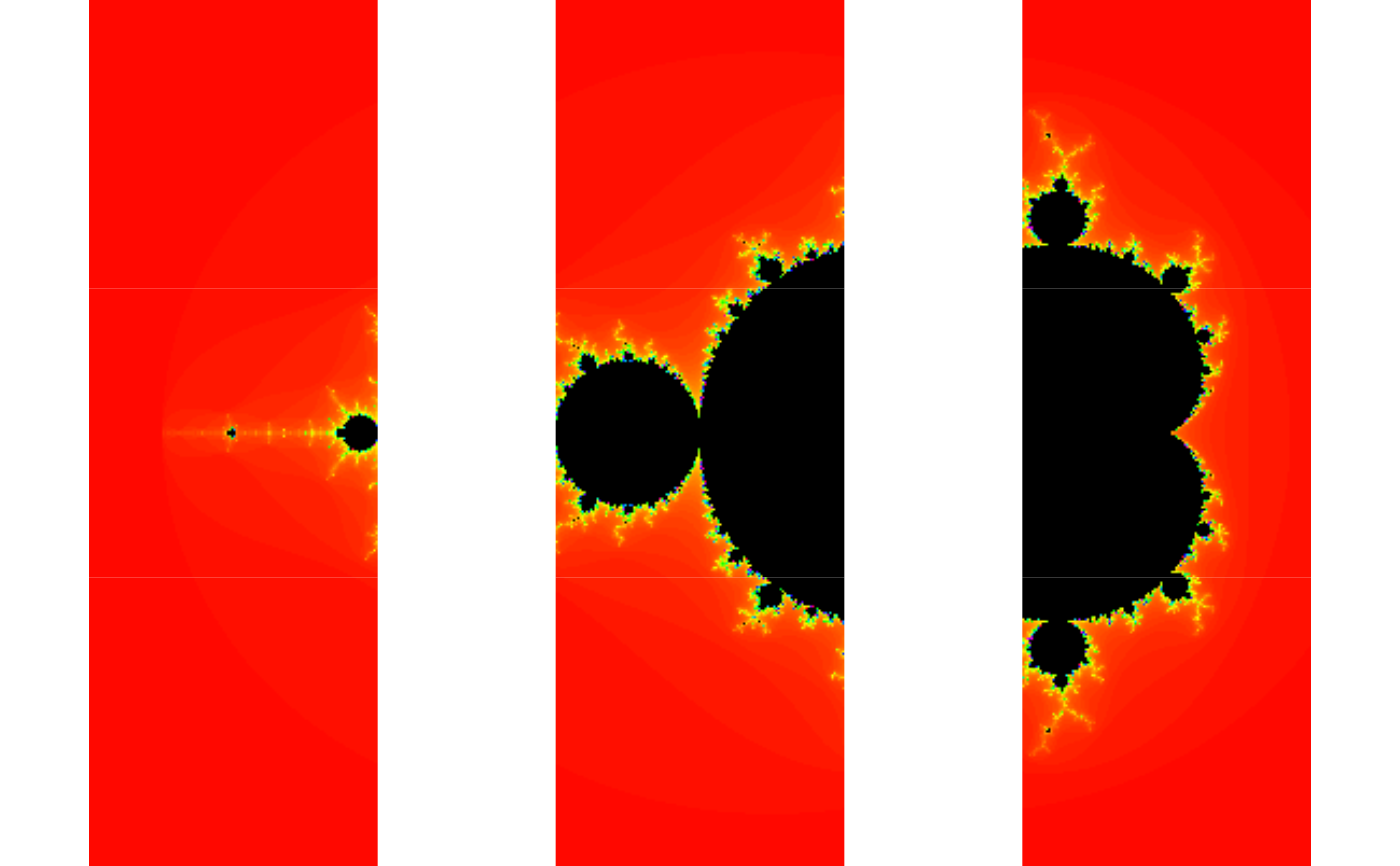The future.callr package implements the Future API on top of callr. The Future API is defined by the future package.
Details
To use callr futures, load future.callr, and
select the type of future you wish to use, e.g.
plan(future.callr::callr).
Author
Maintainer: Henrik Bengtsson henrikb@braju.com (ORCID) [copyright holder]
Examples
# \donttest{
library(future)
plan(future.callr::callr)
demo("mandelbrot", package = "future", ask = FALSE)
#>
#>
#> demo(mandelbrot)
#> ---- ~~~~~~~~~~
#>
#> > library(future)
#>
#> > library(graphics)
#>
#> > plot_what_is_done <- function(counts) {
#> + for (kk in seq_along(counts)) {
#> + f <- counts[[kk]]
#> +
#> + ## Already plotted?
#> + if (!inherits(f, "Future")) next
#> +
#> + ## Not resolved?
#> + if (!resolved(f)) next
#> +
#> + message(sprintf("Plotting tile #%d of %d ...", kk, n))
#> + counts[[kk]] <- value(f)
#> + screen(kk)
#> + plot(counts[[kk]])
#> + }
#> +
#> + counts
#> + }
#>
#> > ## Options
#> > region <- getOption("future.demo.mandelbrot.region", 1L)
#>
#> > if (!is.list(region)) {
#> + if (region == 1L) {
#> + region <- list(xmid = -0.75, ymid = 0.0, side = 3.0)
#> + } else if (region == 2L) {
#> + region <- list(xmid = 0.283, ymid = -0.0095, side = 0.00026)
#> + } else if (region == 3L) {
#> + region <- list(xmid = 0.282989, ymid = -0.01, side = 3e-8)
#> + }
#> + }
#>
#> > nrow <- getOption("future.demo.mandelbrot.nrow", 3L)
#>
#> > resolution <- getOption("future.demo.mandelbrot.resolution", 400L)
#>
#> > delay <- getOption("future.demo.mandelbrot.delay", interactive())
#>
#> > if (isTRUE(delay)) {
#> + delay <- function(counts) Sys.sleep(1.0)
#> + } else if (!is.function(delay)) {
#> + delay <- function(counts) {}
#> + }
#>
#> > ## Generate Mandelbrot tiles to be computed
#> > Cs <- mandelbrot_tiles(xmid = region$xmid, ymid = region$ymid,
#> + side = region$side, nrow = nrow,
#> + resolution = resolution)
#>
#> > if (interactive()) {
#> + dev.new()
#> + plot.new()
#> + split.screen(dim(Cs))
#> + for (ii in seq_along(Cs)) {
#> + screen(ii)
#> + par(mar = c(0, 0, 0, 0))
#> + text(x = 1 / 2, y = 1 / 2, sprintf("Future #%d\nunresolved", ii), cex = 2)
#> + }
#> + } else {
#> + split.screen(dim(Cs))
#> + }
#> [1] 1 2 3 4 5 6 7 8 9
#>
#> > ## Create all Mandelbrot tiles via lazy futures
#> > n <- length(Cs)
#>
#> > message(sprintf("Creating %d Mandelbrot tiles:", n), appendLF = FALSE)
#> Creating 9 Mandelbrot tiles:
#>
#> > counts <- lapply(seq_along(Cs), FUN=function(ii) {
#> + message(" ", ii, appendLF = FALSE)
#> + C <- Cs[[ii]]
#> + future({
#> + message(sprintf("Calculating tile #%d of %d ...", ii, n), appendLF = FALSE)
#> + fit <- mandelbrot(C)
#> +
#> + ## Emulate slowness
#> + delay(fit)
#> +
#> + message(" done")
#> + fit
#> + }, lazy = TRUE)
#> + })
#> 1
#> 2
#> 3
#> 4
#> 5
#> 6
#> 7
#> 8
#> 9
#>
#> > message(".")
#> .
#>
#> > ## Calculate and plot tiles
#> > repeat {
#> + counts <- plot_what_is_done(counts)
#> + if (!any(sapply(counts, FUN = inherits, "Future"))) break
#> + }
#> Plotting tile #1 of 9 ...
#> Calculating tile #1 of 9 ...
#> done
#> Plotting tile #2 of 9 ...
#> Calculating tile #2 of 9 ...
#> done
#> Plotting tile #3 of 9 ...
#> Calculating tile #3 of 9 ...
#> done
#> Plotting tile #4 of 9 ...
#> Calculating tile #4 of 9 ...
#> done
#> Plotting tile #5 of 9 ...
#> Calculating tile #5 of 9 ...
#> done
#> Plotting tile #7 of 9 ...
#> Calculating tile #7 of 9 ...
#> done
#> Plotting tile #8 of 9 ...
#> Calculating tile #8 of 9 ...
#> done
#> Plotting tile #6 of 9 ...
#> Calculating tile #6 of 9 ...
#> done
#> Plotting tile #9 of 9 ...
#> Calculating tile #9 of 9 ...
#> done
 #>
#> > close.screen()
#> [1] 1 2 3 4 5 6 7 8 9
#>
#> > message("SUGGESTION: Try to rerun this demo after changing strategy for how futures are resolved, e.g. plan(multisession).\n")
#> SUGGESTION: Try to rerun this demo after changing strategy for how futures are resolved, e.g. plan(multisession).
# }
#>
#> > close.screen()
#> [1] 1 2 3 4 5 6 7 8 9
#>
#> > message("SUGGESTION: Try to rerun this demo after changing strategy for how futures are resolved, e.g. plan(multisession).\n")
#> SUGGESTION: Try to rerun this demo after changing strategy for how futures are resolved, e.g. plan(multisession).
# }